Study on the Route-Selection Behavior of Bus Passengers Based on an Evolutionary Game under the Condition of Information Guidance
Abstract
:1. Introduction
2. Basic Problem Description
3. Basic Assumptions
- (1)
- Passenger-bounded rationality.
- (2)
- All passengers choose to travel by bus k1 or bus k2 as their travel strategy.
- (3)
- Passengers reserve and select bus vehicles through smart terminal devices. In addition, for buses with different shifts on the same line, passengers can only reserve the bus closest to them.
- (4)
- According to the information on the number of people waiting for reservations in the bus system, passengers consider the benefits of personal travel choices, and finally determine their bus ride plans.
- (5)
- Taking the congestion degree on k1 or k2 as the standard to measure passenger benefit, the lower the congestion degree, the greater the benefit.
- (6)
- Passenger and vehicle information is updated at a certain frequency.
4. Static Game Analysis
4.1. Game Representation
4.2. Game Profit Calculation
5. Research on Evolutionary Game
5.1. Duplicative Dynamic
5.2. Evolutionary Stability Strategies (ESS)
- (1)
- When , and , so .
- (2)
- When , and , so .
- (3)
- When , , and , so .
5.3. Induction Strategy Suggestions
6. Conclusions
Author Contributions
Funding
Institutional Review Board Statement
Informed Consent Statement
Data Availability Statement
Conflicts of Interest
References
- Shi, X.; Moudon, A.V.; Hurvitz, P.M.; Mooney, S.J.; Zhou, C.; Saelens, B.E. Does improving stop amenities help increase Bus Rapid Transit ridership? Findings based on a quasi-experiment. Transp. Res. Interdiscip. Perspect. 2021, 10, 100323. [Google Scholar] [CrossRef]
- Fonzone, A.; Schmöcker, J.-D. Effects of transit real-time information usage strategies. Transp. Res. Rec. 2014, 2417, 121–129. [Google Scholar] [CrossRef]
- Wu, F.; Hu, X.; An, S.; Zhang, D. Exploring passengers’ travel behaviors based on elaboration likelihood model under the impact of intelligent bus information. J. Adv. Transp. 2019, 2019, 9095279. [Google Scholar] [CrossRef]
- Trozzi, V.; Gentile, G.; Kaparias, I.; Bell, M.G.H. Effects of Countdown Displays in Public Transport Route Choice Under Severe Overcrowding. Netw. Spat. Econ. 2015, 15, 823–842. [Google Scholar] [CrossRef] [Green Version]
- Drabicki, A.; Kucharski, R.; Cats, O. Mitigating bus bunching with real-time crowding information. Transportation 2022, 1–28. [Google Scholar] [CrossRef] [PubMed]
- Yu, B.; Li, T.; Kong, L.; Wang, K.; Wu, Y.X. Passenger boarding choice prediction at a bus hub with real-time information. Transp. B Transp. Dyn. 2015, 3, 192–221. [Google Scholar] [CrossRef]
- Abdoos, M. A Cooperative Multi-Agent System for Traffic Signal Control Using Game Theory and Reinforcement Learning. IEEE Intell. Transp. Syst. Mag. 2020, 13, 6–16. [Google Scholar] [CrossRef]
- Talebpour, A.; Mahmassani, H.S.; Hamdar, S.H. Modeling Lane-Changing Behavior in a Connected Environment: A Game Theory Approach. Transp. Res. Procedia 2015, 7, 420–440. [Google Scholar] [CrossRef] [Green Version]
- Sagratella, S.; Schmidt, M.; Sudermann, M.N. The noncooperative fixed charge transportation problem. Eur. J. Oper. Res. 2020, 284, 373–382. [Google Scholar] [CrossRef]
- Guan, H.Z.; Pu, L. A drivers’ choice behavior model based on evolutionary game theory. J. Beijing Univ. Technol. 2010, 36, 1077–1083. [Google Scholar]
- Corman, F. Interactions and equilibrium between rescheduling train traffic and routing passengers in microscopic delay management: A game theoretical study. Transp. Sci. 2020, 54, 785–822. [Google Scholar] [CrossRef]
- Bouman, P.C.; Kroon, L.; Vervest, P.; Maróti, G. Capacity, information and minority games in public transport. Transp. Res. Part C Emrg. Technol. 2016, 70, 157–170. [Google Scholar] [CrossRef]
- Newton, J. Evolutionary Game Theory: A Renaissance. Games 2018, 9, 31. [Google Scholar] [CrossRef] [Green Version]
- Weibull, J. Evolutionary Game Theory; MIT Press: Cambridge, MA, USA, 1995; pp. 30–31. [Google Scholar]
- Xie, S.Y. Economic Game Theory; Fudan University Press: Shanghai, China, 2007; pp. 227–228. [Google Scholar]




| F1 | |||
| S | G | ||
| F2 | S | P1(S,S) | P3(S,G) |
| G | P4(G,S) | P2(G,G) | |
| F2 | |||
| S | G | ||
| F1 | S | ) | ) |
| G | ) | ) | |
| F2 | |||
| S | G | ||
| F1 | S | ) | ) |
| G | ) | ) | |
Publisher’s Note: MDPI stays neutral with regard to jurisdictional claims in published maps and institutional affiliations. |
© 2022 by the authors. Licensee MDPI, Basel, Switzerland. This article is an open access article distributed under the terms and conditions of the Creative Commons Attribution (CC BY) license (https://creativecommons.org/licenses/by/4.0/).
Share and Cite
Hu, X.; Qin, H.; Guo, J.; Xu, Y.; Liu, W.; Zhou, X. Study on the Route-Selection Behavior of Bus Passengers Based on an Evolutionary Game under the Condition of Information Guidance. Appl. Sci. 2022, 12, 6703. https://doi.org/10.3390/app12136703
Hu X, Qin H, Guo J, Xu Y, Liu W, Zhou X. Study on the Route-Selection Behavior of Bus Passengers Based on an Evolutionary Game under the Condition of Information Guidance. Applied Sciences. 2022; 12(13):6703. https://doi.org/10.3390/app12136703
Chicago/Turabian StyleHu, Xinghua, Hongbin Qin, Jianpu Guo, Yimei Xu, Wei Liu, and Xiaochuan Zhou. 2022. "Study on the Route-Selection Behavior of Bus Passengers Based on an Evolutionary Game under the Condition of Information Guidance" Applied Sciences 12, no. 13: 6703. https://doi.org/10.3390/app12136703
APA StyleHu, X., Qin, H., Guo, J., Xu, Y., Liu, W., & Zhou, X. (2022). Study on the Route-Selection Behavior of Bus Passengers Based on an Evolutionary Game under the Condition of Information Guidance. Applied Sciences, 12(13), 6703. https://doi.org/10.3390/app12136703






